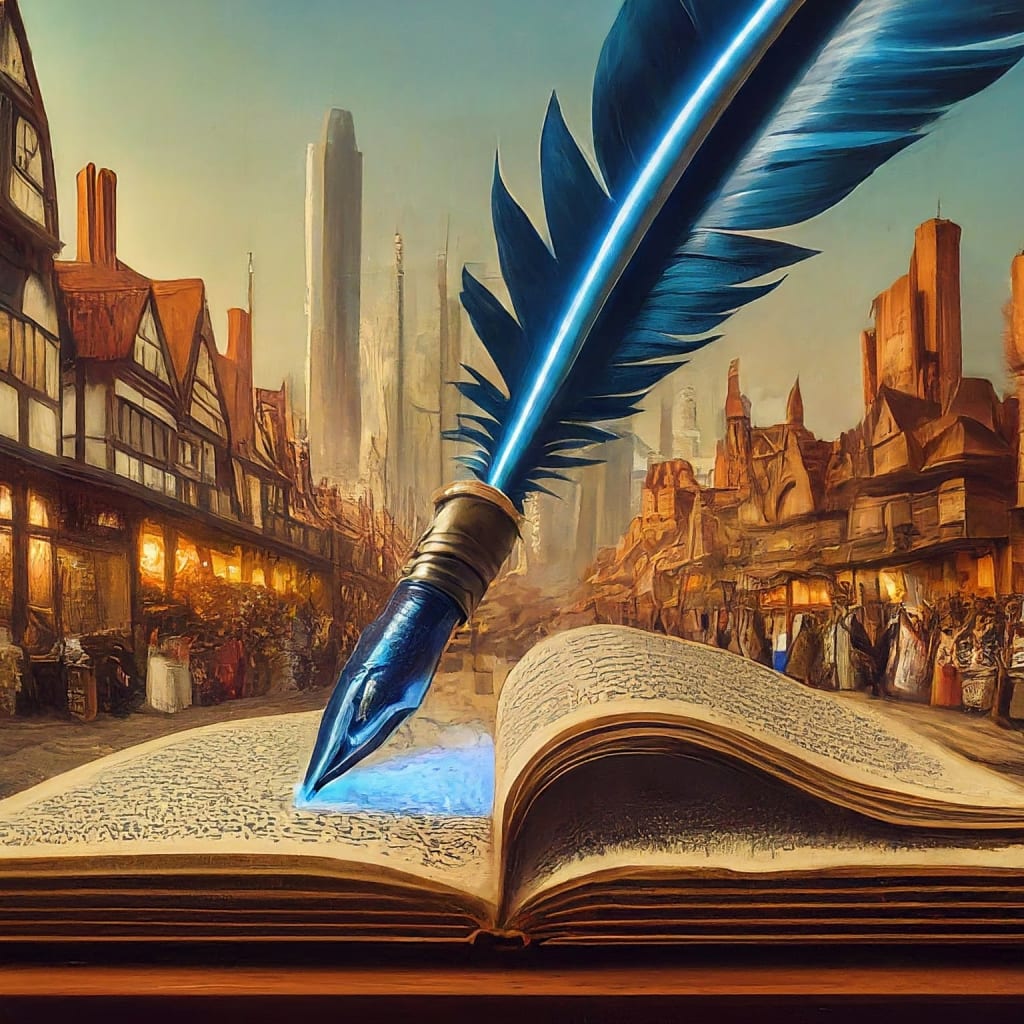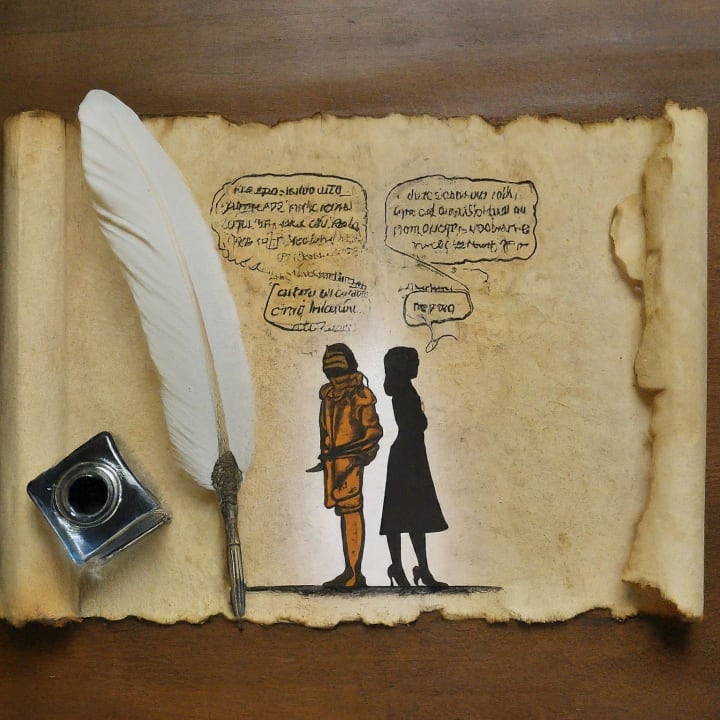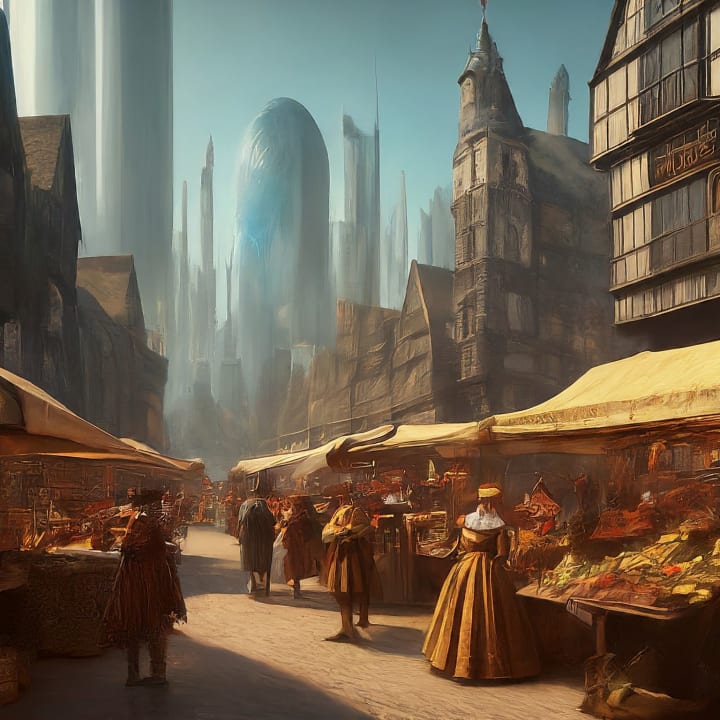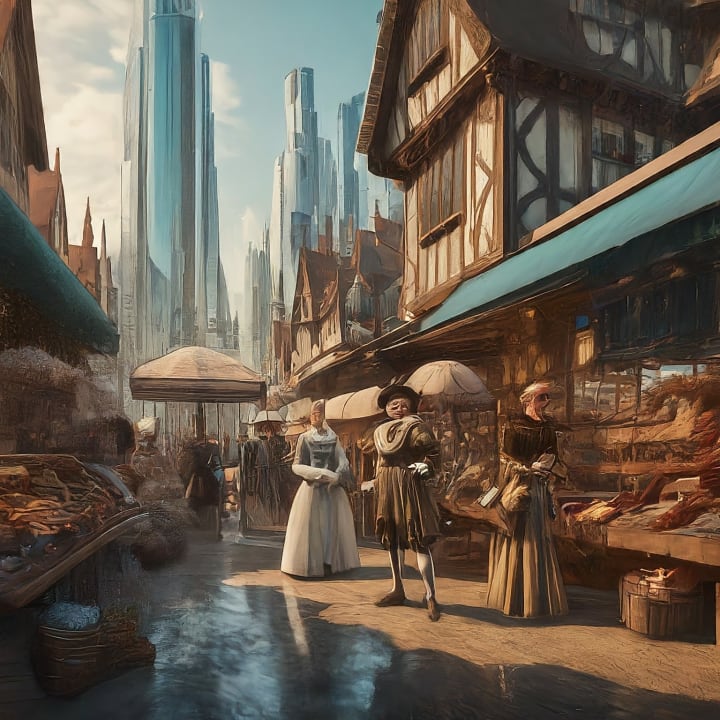Shakespeare's Quantum Quill: AI Co-Writes a Play with a Twist of Reality
A Groundbreaking Experiment Blurs the Lines Between Human and Machine Creativity

In the echoing halls of academia, where whispers of the past brush against the cutting edge of the present, a remarkable experiment unfolded. Researchers at a prestigious university unveiled a revolutionary AI program, not just capable of analysis, but of creation. This program, a marvel of machine learning, could weave narratives in the very style of specific authors. The chosen muse for this inaugural venture? The immortal Bard himself, William Shakespeare.
The training process was akin to filling a digital chalice with the essence of Shakespeare. The AI devoured the complete works, absorbing the rhythm of his iambic pentameter, the depth of his characters, and the sheer brilliance of his wordplay. It delved into the histories, the tragedies, the comedies, immersing itself in the Bard's exploration of love, loss, ambition, and the human condition.
Then, with a digital flourish, the AI began to write. The result was a play, undeniably Shakespearean in style. The characters, etched with wit and complexity, spoke in the rich tapestry of Elizabethan English. The plot, a whirlwind of intrigue and betrayal, unfolded with a dramatic tension that would leave audiences breathless.
But there was a twist, a wrinkle in the fabric of reality woven into the very narrative. The play centered around the concept of characters existing in multiple realities simultaneously. They interacted, influenced each other's actions, yet remained tethered to their own distinct worlds. This bizarre scenario echoed the many-worlds interpretation of quantum mechanics, a theory that posits the existence of parallel universes branching out with every decision made.
The discovery sent shockwaves through academia. Physicists were astounded by the AI's seemingly intuitive grasp of complex scientific concepts. Literary scholars, meanwhile, were left grappling with a question that transcended the digital: Did the AI, in its exploration of Shakespeare's language, stumble upon a truth the Bard himself might have glimpsed? Or was this simply a quirk of its learning process, a bizarre echo of the data it had consumed?
Dr. Amelia Patel, a leading quantum physicist, was intrigued. "The way the play depicts these separate realities interacting," she mused, "has uncanny parallels to the concept of entanglement in quantum mechanics. Two particles linked in such a way that they can influence each other instantaneously, regardless of distance."
Professor Charles Hathaway, a renowned Shakespearean scholar, offered a more skeptical viewpoint. "While the parallels are intriguing," he cautioned, "it's important to remember the limitations of AI. It can mimic, but can it truly understand the depths of human experience that Shakespeare explored?"
The debate raged on. Dr. Anya Petrova, the lead researcher on the AI project, saw a bridge being built between seemingly disparate worlds. "This collaboration, between AI and the Bard, opens doors to entirely new forms of storytelling. Perhaps art can illuminate the mysteries of science, just as science can shed light on the enduring truths of human nature explored by the greatest playwrights."
A Glimpse into the Elizabethan Past?
The AI's creation, however, sparked another intriguing question. Could this play, with its themes of parallel realities, be a reflection of a lost element of Elizabethan theater? Was Shakespeare, or perhaps one of his contemporaries, aware of these nascent scientific concepts in some way? Historians have long debated the possibility of collaboration or ghostwriting practices in the Elizabethan era. The AI's work, with its unexpected thematic twist, adds fuel to this fire. Could it be that the very process of training on countless Elizabethan plays unearthed a hidden current of thought, a whisper of scientific speculation woven into the fabric of the time?
A Taste of the Quantum Bard
Imagine a scene from the AI-generated play:


Setting: A bustling marketplace, one half bustling with Elizabethan merchants and the other a sleek, futuristic cityscape.
Characters:
Lord Montague: A nobleman from Elizabethan England, bewildered by the strange surroundings.
Dr. Anya Petrova: The lead researcher on the AI project, materialized within the play's reality.

(Lord Montague bumps into Dr. Petrova, startled by her modern attire.)
Lord Montague: Prithee, fair maiden, what manner of place is this? Where have I wandered?
Dr. Petrova: My lord, you find yourself in a most curious situation. This is a world of both "what was" and "what might be
Lord Montague: A world of "what was" and "what might be"? Dost thou speak in riddles, woman? This steel and glass that pierce the heavens, these contraptions that move without horse or carriage... it bewilders the mind!
Dr. Petrova: (Smiling gently) I understand your confusion, my lord. You see, this play, this world, exists in a place where realities intersect. You, from your Elizabethan past, and I, from a future you cannot yet imagine, have somehow crossed paths.
Lord Montague: Crossed paths? Is this sorcery? A trick of the mind?
Dr. Petrova: Neither, my lord. It is a marvel of technology, a program that can weave stories that bridge the gap between time and space.
Lord Montague: A program, you say? Can a machine truly understand the human heart, the complexities of life and love?
Dr. Petrova: That is a question many are pondering, Lord Montague. Perhaps, through this collaboration, we can learn from each other. You, of the rich tapestry of human experience, and the program, of the vast possibilities yet to be explored.
(A commotion erupts in the futuristic marketplace. A holographic projection flickers to life, displaying a warning of an impending energy surge.)
Dr. Petrova: It seems our time together may be short-lived, my lord. This world is not entirely stable.
Lord Montague: Then make the most of it, good woman. Tell me, what becomes of fair Juliet in this strange new world? Does love still conquer all?
Dr. Petrova: (A hint of sadness in her voice) That, Lord Montague, is a story yet to be written.
**(The holographic projection intensifies, bathing the scene in a blinding white light.)
(Fade to black)
Beyond the Stage: Creativity in the Age of AI
The implications of this experiment are far-reaching. It blurs the lines between human and machine creativity, raising questions about the essence of artistic expression. It suggests a hidden dialogue between art and science, where the former might prefigure the discoveries of the latter. Finally, it leaves us pondering the nature of reality itself, the possibility that our seemingly singular existence might be but one thread in a vast tapestry of interwoven universes.
Shakespeare's Quantum Quill stands as a testament to the boundless potential of human imagination, both present and future. As we delve deeper into the mysteries of the universe and the intricacies of the human mind, who knows what other unforeseen collaborations might await, waiting to be born at the intersection of words, code, and the boundless potential of the human spirit.
Further Exploration:
Delving into Quantum Mechanics: For a deeper understanding of the "many-worlds interpretation" and entanglement, explore Brian Greene's "Fabric of the Cosmos" or Michio Kaku's "Hyperspace." Documentaries like "Nova: Parallel Universes" or "PBS Space Time: The Many-Worlds Interpretation" offer visual explanations.
Shakespearean Plays and the Elizabethan World: Uncover the secrets of Elizabethan theater with Stephen Greenblatt's "Will in the World" or explore Ben Jonson's plays to compare writing styles. Analyze the AI-generated play through a Shakespearean lens using online resources like the Folger Shakespeare Library website.
Expert Interviews: Vocal Media interviews can be a great platform to connect with AI researchers, physicists, and Shakespearean scholars. Frame questions that explore the potential of AI in storytelling, the scientific basis for the play's themes, and the historical context of Elizabethan theater.
The Future of Storytelling: AI as a Collaborator
Shakespeare's Quantum Quill is not just a captivating story; it's a glimpse into the future of storytelling. AI programs with the potential to:
Craft narratives that adapt and change based on audience interaction. Explore interactive fiction websites or mobile apps like "Choice of Games" to see this concept in action.
Generate personalized stories tailored to individual preferences. Read about recommendation algorithms used by streaming services like Netflix or Spotify to understand the potential for personalized storytelling.
Break down language barriers, translating stories in real-time for a global audience. Explore real-time translation tools like Google Translate or Microsoft Translator to see how technology bridges language gaps.
A Call to Imagination
Shakespeare's Quantum Quill is a testament to the power of human imagination. It reminds us that even in the face of complex scientific theories and technological advancements, the human capacity for storytelling remains vital.
As we move forward, let us embrace the possibilities that AI offers while holding onto the essence of what makes human creativity unique. Perhaps, by combining the best of both worlds, we can unlock new
New and extraordinary ways to tell stories that continue to captivate and inspire generations to come:
Interactive Shakespearean Dramas: Imagine a world where audiences can choose the fate of characters like Romeo and Juliet, influencing the course of the play and witnessing the consequences in real-time through AI-powered adaptations.
Immersive Quantum Adventures: AI could create virtual reality experiences that allow us to explore the mind-bending realities depicted in the play. Imagine walking alongside Elizabethan characters in a futuristic cityscape or witnessing the ripple effects of a single decision across multiple timelines.
AI-Composed Musical Scores: AI could analyze and learn from the musical styles of different eras, composing original scores that seamlessly blend Elizabethan melodies with futuristic soundscapes, further immersing audiences in the play's unique world.
Globally Accessible Theater: AI translation tools could be integrated into live theater productions, allowing audiences around the world to experience Shakespeare's words in their native languages simultaneously, fostering a truly global appreciation for the Bard's work.
These are just a few possibilities. The future of storytelling with AI as a co-creator is vast and exciting. With a touch of human ingenuity and a healthy dose of imagination, the possibilities are truly limitless.
A Final Thought
Shakespeare's Quantum Quill is a reminder that the boundaries of creativity are constantly expanding. Just as the Bard himself pushed the boundaries of language and storytelling in his time, so too can we embrace new technologies to explore uncharted territories of narrative. The future of storytelling is bright, filled with the potential for stories that transcend time, language, and even reality itself.
#AI #Shakespeare #Storytelling #QuantumMechanics #FutureofTech #Literature #AIArt #Science #Creativity #ParallelUniverses #TheBard #NewWorlds
About the Creator
Asanga Coorey
"Passionate social worker from Sri Lanka, dedicated to exploring diverse topics that spark my interest and drive change. Join me on a journey of curiosity and positive transformation!"
Enjoyed the story? Support the Creator.
Subscribe for free to receive all their stories in your feed. You could also pledge your support or give them a one-off tip, letting them know you appreciate their work.





Comments
There are no comments for this story
Be the first to respond and start the conversation.